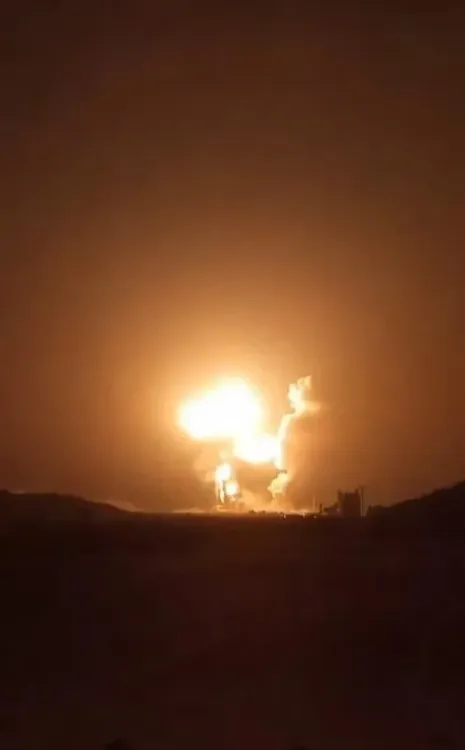Did Israeli Airstrikes on Yemen's Hodeidah Province Result in Casualties?

Synopsis
Key Takeaways
- Israeli airstrikes on Yemen's Hodeidah led to casualties and infrastructure damage.
- The strikes were a response to Houthi attacks against Israel.
- The humanitarian situation in Yemen is at risk of further deterioration.
- Local reports indicated significant damage to vital facilities.
- The conflict illustrates the complex dynamics in the region.
Sanaa, May 6 (NationPress) In a series of airstrikes, Israeli warplanes targeted Yemen's Hodeidah province, leading to the death of two individuals and injuring 42 more, as reported by health officials associated with the Houthi militant organization.
The assaults inflicted substantial damage on critical infrastructure, including a port, an airport, and various factories, intensifying regional tensions just a day after the Houthis claimed responsibility for a missile attack near Tel Aviv's Ben Gurion Airport, which resulted in eight injuries, according to the Xinhua news agency.
Al-Masirah TV, under Houthi control, reported that 48 airstrikes hit the Red Sea province, targeting Hodeidah's port city, its airport, a cement factory, and military installations located northeast of the city. Health officials confirmed that the casualties included factory workers and residents from the nearby Bajil district.
Local witnesses informed Xinhua that the airstrikes severely compromised the port's infrastructure, including cargo-handling facilities, and caused damage to several private factories. Smoke was seen billowing over the city, with residents describing the attacks as paralyzing daily life.
The Israel Defense Forces (IDF) acknowledged the operation, stating that around 20 warplanes struck Houthi positions along Yemen's western coast using 50 precision-guided munitions. The IDF indicated that the targets were part of the “Houthi terror regime's infrastructure.” This mission occurred approximately 1,700 km from Israeli territory.
The Houthis alleged that the airstrikes on Hodeidah were executed in collaboration with the United States and Israel, although the IDF did not confirm any US involvement.
According to the IDF, the airstrikes were a response to ongoing assaults by the Houthi regime against Israel, citing recent missile and drone attacks.
The strikes on Hodeidah have direct ramifications for the port, a vital source of goods, medicine, and fuel for millions residing in Houthi-controlled territories. These actions threaten to exacerbate the already precarious humanitarian situation in Yemen.
In a separate report, Al-Masirah and local sources indicated that at least 20 US airstrikes were carried out on Houthi-controlled locations in the capital Sanaa and the northern provinces of Marib and Al-Jawf. There was no immediate response from US Central Command.
This escalation follows a missile strike, claimed by the Houthis, near Ben Gurion Airport on Sunday, resulting in eight injuries and a temporary halt to airport operations. Israeli officials admitted that missile defense systems failed to intercept the missile despite multiple attempts.
The Houthis asserted that the strike was in retaliation for Israel's military operations in Gaza. Israeli Prime Minister Benjamin Netanyahu promised a stringent response, targeting the group's alleged backers in Iran.
Controlling much of northern Yemen, including Sanaa and Hodeidah, the Houthis have launched missiles and drones toward Israel and Red Sea shipping routes in recent months, stating these attacks are in support of Palestinians and will persist until Israel ceases its offensive in Gaza and permits unrestricted humanitarian access.










